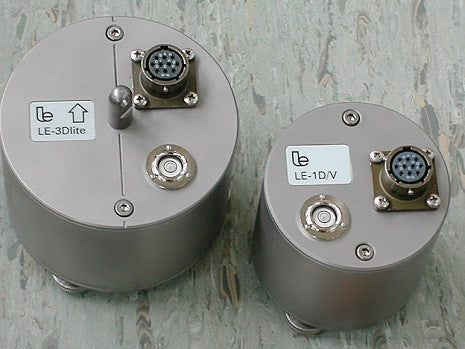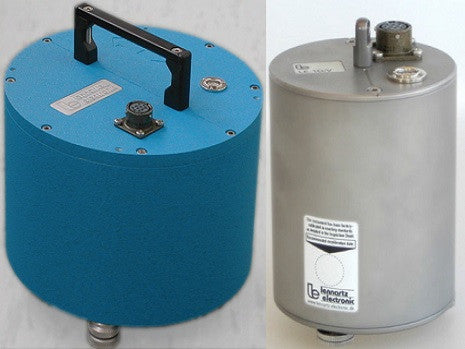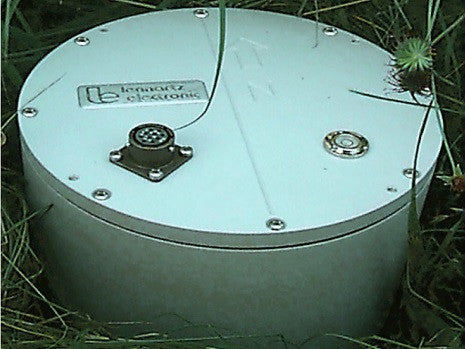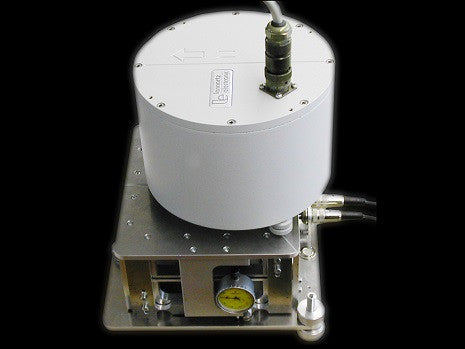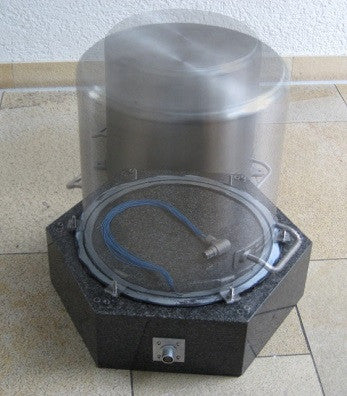LE-3Dlite - LE-1DV: High Performance 1 Hz Seismometer
Supplied By: Lennartz Electronic, Germany
Rs. 0.00
Compact, High Performance Three-Component 1 Hz Seismometer (LE-3Dlite MKIII & LE-3Dlite MKII)
The LE-3Dlite MKIII Seismometer
Lennartz seismometers have a 25+ years track record all over the world, and it was the LE-3D »classic« that started it all. Now in its fourth evolutionary incarnaction, the LE-3Dlite MkIII offers the time-proven workhorse reliability of the original LE-3D paired with improved handling features, water tightness, and compatibility across the entire Lennartz sensor product line. Noise performance and power consumption have been further improved (even better than MkII). Ideally suited for mobile applications of any kind, LE-3Dlite MkIII is also the sensor of choice in many observatory stations, and has replaced clumsy mechanical sensors.

At a fraction of the bulk and weight, and with vastly superior handling properties, there really isn‘t much of a competition between mechanical and electronic. Here‘s a comparison between LE1D/V and a well-known classic mechanical 1D design:
But using a modern electronically enhanced seismometer has more advantages: Each sensor is individually adjusted and calibrated to less than 1% deviation from the theoretical transfer function and transduction factor, so sensors are perfectly interchangeable without the need to keep track of which sensor was connected to which station at which time. Mechanical sensors have much greater parameter variance, both between individual instruments and over time.
Lennartz sensors are extremely stable in the long term. An affordable recalibration service is offered for those needing written proof of the fact. Also, contrary to most mechanical sensors, Lennartz sensors do not require any kind of transportation locking, nor do they require excessive settling time. A useful signal is present just a few seconds after power-up. Poles and zeroes of the transfer function are supplied with the instrument, making deconvolution easy. Given a reasonable signal:noise ratio, LE-3Dlite MkIII data can be deconvolved down to 20 seconds and beyond.


Unique Features of the LE-3DLite Seismometer
-
Extremely compact and lightweight
-
Rugged
-
Sheer simplicity; true plug-and-play operation
-
All sensors calibrated to identical output voltages; no need to keep records of which sensor has been connected to which datalogger
-
Low noise, low power (typically 6 mA per component @ 12 V DC)
-
Dynamic range > 130 dB
-
Comparatively insensitive to improper leveling
-
No mass lock, mass center, control box, or other contraption required; can be transported in any orientation
-
Proven long-term stability; over fifteen years of field experience
| Technical Data for LE-3Dlite MKIII | |
|---|---|
| Power Supply: | 10…16 V DC unstabilized |
| Power Consumption @ 12 V DC: | 6 mA |
| Transduction factor: | 800 V/m/s differential, precisely adjusted |
| Damping: | .707 critical, precisely adjusted |
| Dimensions: | 65x95 mm (HxØ) |
| Weight: | 1.6 Kg |
| Temperature Range: | -15…+60 °C |
| Eigenfrequency: | 1 Hz |
| Upper Corner Frequency | 100 Hz |
| RMS Noise @ 1Hz: | <3 nm/s |
| Dynamic Range: | 136 dB |
The LE-3Dlite MKII Seismometer
Lennartz seismometers have a 25+ years track record all over the world, and it was the LE-3D »classic« that started it all. Now in its third evolutionary incarnaction, the LE-3Dlite MKII offers the time-proven workhorse reliability of the original LE-3D paired with improved handling features, water tightness, and compatibility across the entire Lennartz sensor product line. Noise performance and power consumption have been further improved (even better than MkII). Ideally suited for mobile applications of any kind, LE-3Dlite MKII is also the sensor of choice in many observatory stations, and has replaced clumsy mechanical sensors.

At a fraction of the bulk and weight, and with vastly superior handling properties, there really isn‘t much of a competition between mechanical and electronic. Here‘s a comparison between LE1D/V and a well-known classic mechanical 1D design:
But using a modern electronically enhanced seismometer has more advantages: Each sensor is individually adjusted and calibrated to less than 1% deviation from the theoretical transfer function and transduction factor, so sensors are perfectly interchangeable without the need to keep track of which sensor was connected to which station at which time. Mechanical sensors have much greater parameter variance, both between individual instruments and over time.
Lennartz sensors are extremely stable in the long term. An affordable recalibration service is offered for those needing written proof of the fact. Also, contrary to most mechanical sensors, Lennartz sensors do not require any kind of transportation locking, nor do they require excessive settling time. A useful signal is present just a few seconds after power-up. Poles and zeroes of the transfer function are supplied with the instrument, making deconvolution easy. Given a reasonable signal:noise ratio, LE-3Dlite MKII data can be deconvolved down to 20 seconds and beyond.

| Technical Data for LE-3Dlite MKII | |
|---|---|
| Power Supply: | 10…16 V DC unstabilized |
| Power Consumption @ 12 V DC: | 8 mA |
| Transduction factor: | 400 V/m/s differential, precisely adjusted |
| Damping: | .707 critical, precisely adjusted |
| Dimensions: | 65x95 mm (HxØ) |
| Weight: | 1.6 Kg |
| Temperature Range: | -15…+60 °C |
| Eigenfrequency: | 1 Hz |
| Upper Corner Frequency | 100 Hz |
| RMS Noise @ 1Hz: | <3 nm/s |
| Dynamic Range: | 136 dB |
Compact, High Performance Single-Component 1 Hz Seismometer (LE-1DV MKIII & LE-1DV MKII)
| Technical Data for LE-1DV MKIII & LE-1DV MKII | ||
|---|---|---|
| Specifications: | LE-1DV MKIII | LE-1DV MKII |
| Power Supply: | 10…16 V DC unstabilized | 10…16 V DC unstabilized |
| Power Consumption @ 12 V DC: | 2.6 mA | 3 mA |
| Transduction factor: | 800 V/m/s differential, precisely adjusted | 400 V/m/s differential, precisely adjusted |
| Damping: | .707 critical, precisely adjusted | |
| Dimensions: | 85x55 mm (HxØ) | |
| Weight: | 1.1 Kg | |
| Temperature Range: | -15…+60 °C | |
| Eigenfrequency: | 1 Hz | |
| Upper Corner Frequency | 100 Hz | |
| RMS Noise @ 1Hz: | <<3 nm/s | |
| Dynamic Range: | 136 dB | |
Related Products

